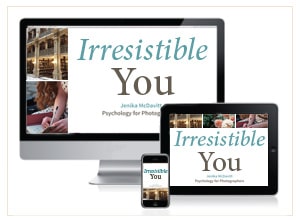The Blog Library
The Two-Part Psychological Trap That Snares Your Marketing
Like most traps, it’s got two halves.
The first half: That the way clients hear something described impacts their desire to have it.
Psychologists call this a “framing effect.”
For example: People prefer meat labeled “75% lean” over meat labeled “25% fat.” Even though either way, you’re getting the same thing.
This applies in more serious situations, too – if a surgeon describes a treatment as having a “10% mortality rate,” the patient is more likely to refuse the treatment than if the doctor said “it has a 90% success rate.” Same pattern if they say a medical device will “help you breathe” vs. “control your breathing” – people greatly prefer being “helped” even though both phrases are accurate.
The way you describe things matters. The things you focus on matter – even if the end result would be the same.
The second half: We tend to look at things through the lens of our profession, rather than step outside ourselves.
If you’re an orthopedist watching your neighbor’s kids jump on a trampoline, you might think “well, there’s a broken ankle waiting to happen.” Meanwhile, your neighbor is watching their kids thinking “I’m so glad that Joey and Josie are finally having fun together and not arguing.”
If you’re a pianist and you go to a concert, all you can hear are the accompanist’s errors – while others simply tap their feet along to the singers and enjoy the performance.
And I KNOW you photographers out there have seen friends’ vacation photos and spent time analyzing how the light could have been better if they’d just done X…am I right? (Guilty.)
We can’t help but see things from the perspective of our profession. That’s not really “right” or “wrong.” We’ve just spent time training our minds, so no wonder our minds reorganize themselves around certain guiding principles.
Psychologists call this the “curse of knowledge” (you can use the fancier term – deformation professionnelle – if you want to impress people). Once you know something it’s hard to un-know it.
Can you already see where the trap snaps shut on you?
 You go to describe what you offer to your clients. And you’re looking at things from your professional perspective.
You go to describe what you offer to your clients. And you’re looking at things from your professional perspective.
Which means that you tend to frame things the way YOU see them:
Get your Christmas card sessions done early – we’ll make it fun for the whole family!
Gorgeous leather albums will preserve your memories forever!
None of that stuff is inaccurate or wrong. But your view point might be considerably narrower than your clients’, who have an entirely different set of concerns:
When exactly am I going to do this? We have soccer practice every weekend. Can I afford it? This is a busy month already, maybe I’ll just ask my neighbor to do it. Oh shoot, the dog needs to be let out.
Since what you wrote doesn’t exactly nail their frame of mind and concerns, your message may or may not land.
Here’s how you can avoid the trap altogether (not to mention convert more clients – BOOM!):
When you go to write for business, take off your professional hat for a minute. Then FULLY immerse yourself in empathy for your client first.
I mean it. Take a second and really look at their whole life.
Consider everything they’ve got going on. Let compassion for how busy they are, for how much they’re trying to do, for how wonderful they are – well up inside you.
You will probably find that the next thing you write comes from a different place:
When you look back at this time, you’re going to remember pudgy hands pressing cookie cutters into yellow dough. Showers of glitter spilling out of backpacks from Christmas crafts (grr!). The rattle of the back door and the sound of snow boots thudding on the linoleum. Why not have this year’s Christmas photos reflect what you’ll remember about season? Learn more about my in-home sessions here.
You might find that your offers even change slightly:
You know you told yourself you wanted to send Christmas cards this past summer – let me do the leg work right now! Stamps and envelopes included, delivered to your door. That way you can spend the first week in December listening to your kids’ Christmas concerts, not standing in line at the post office.
If you try this I think you might be amazed with the next thing you write.
A major reason photographers and artists trend toward sounding the same online is because they’re all busy looking at things from the lens of their profession. Which they all have in common.
Clients should be able to put their hand over their mini feed and know which post is yours alone.
You have the best shot at doing that in part when they know you’re the one who “gets” what they’re thinking, and when you give specific examples of how you can help.
When you don’t just casually post “a new session” on your blog, because you know that to them, this isn’t just another session, it’s a major, expensive, once-a-year event – and you spend time describing what it’s like – for them.
That means embracing empathy, the same way you’d have empathy for a friend who told them what a long day it has been. “I get that you’re dealing with ____, _____, and ____. What if I _______ for you?”
When you take off your “professional” hat and step back into being yourself, empathy flows more freely.
Of course you’re still being professional – offering consistent results, having clear boundaries, charging appropriately, etc.
But stepping outside of your professional role before you write, and letting their perspective fill you up – makes you so much readier to frame your offerings in ways that excite.
I bet you are already great at empathizing with people. You do it all the time in your regular life, and embracing that skill as a business tool will help you tell people how you can help them.
Try it out next time you go to write something – especially if you don’t know where to start.
I think you’ll surprise yourself by how much you already know what to say.
Know what’s interesting about my class Irresistible You?
One core facet of this course is studying your clients.
Why? Well partly because:
Showing up more completely in your business lets you really be there for them. When they see you and know you more, they can trust you more easily. Your empathy comes across as more genuine, and this helps them sell themselves on your services.
When you run a small service business, not showing up enough can diminish trust and cut the very connections that make you stand out. So it’s important to know who they are to maximize those effects.
Don’t worry – we get extremely practical about self-presentation. You’ll learn exactly what they need to hear, how to take advantage of specific psychology influences, what kinds of posts to write, and secrets that magnetic people use (hint: they don’t actually involve sharing that much!).
But the end result is a sharper focus on who you are, and who they are. This helps you know what to say before you even sit down, because you know exactly what they need to hear – and which parts of your experiences match their needs.
Boy does that speed things up!
If you’re interested, head on over!
P.S. By popular demand, you can also grab special bundles in any combination with my other products.
Check it out at the bottom of the page!







I really love the shots,the brown leaves on the neighborhood. Autumn season feels.